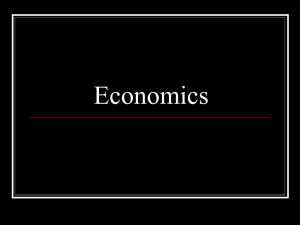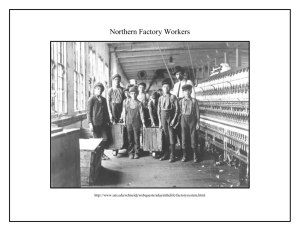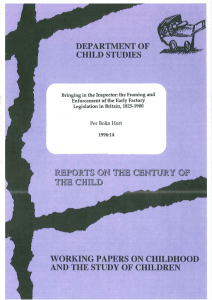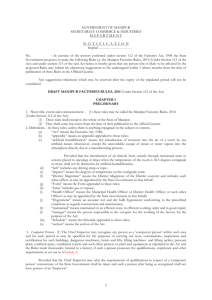Factories Regulation Act, 1833
advertisement
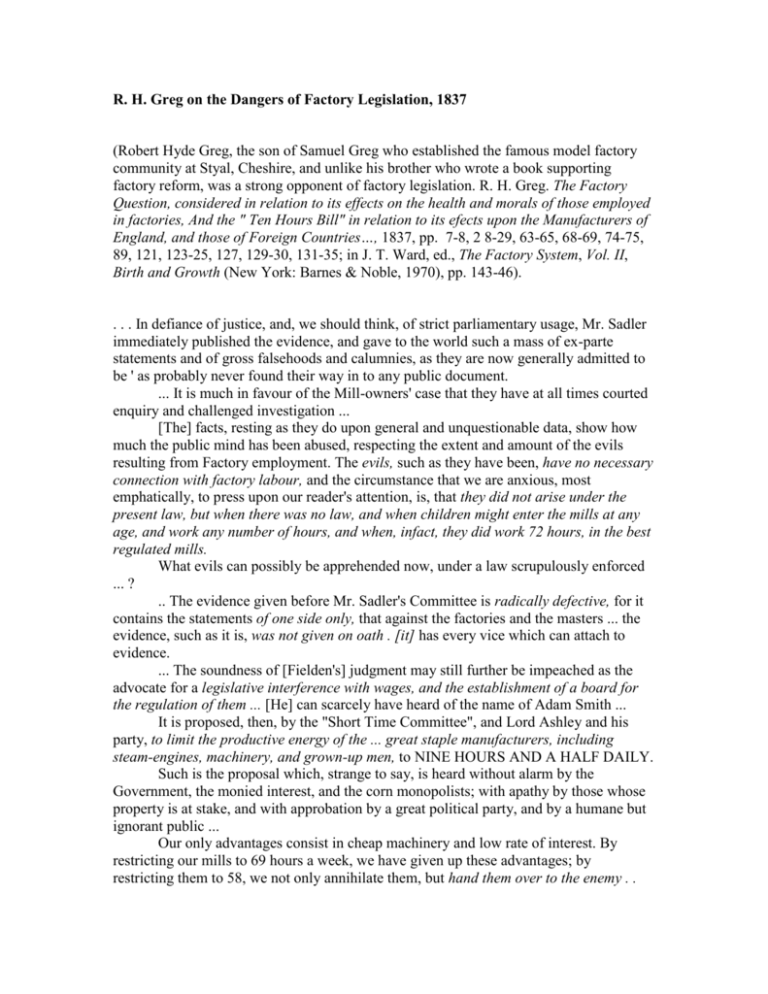
R. H. Greg on the Dangers of Factory Legislation, 1837 (Robert Hyde Greg, the son of Samuel Greg who established the famous model factory community at Styal, Cheshire, and unlike his brother who wrote a book supporting factory reform, was a strong opponent of factory legislation. R. H. Greg. The Factory Question, considered in relation to its effects on the health and morals of those employed in factories, And the " Ten Hours Bill" in relation to its efects upon the Manufacturers of England, and those of Foreign Countries…, 1837, pp. 7-8, 2 8-29, 63-65, 68-69, 74-75, 89, 121, 123-25, 127, 129-30, 131-35; in J. T. Ward, ed., The Factory System, Vol. II, Birth and Growth (New York: Barnes & Noble, 1970), pp. 143-46). . . . In defiance of justice, and, we should think, of strict parliamentary usage, Mr. Sadler immediately published the evidence, and gave to the world such a mass of ex-parte statements and of gross falsehoods and calumnies, as they are now generally admitted to be ' as probably never found their way in to any public document. ... It is much in favour of the Mill-owners' case that they have at all times courted enquiry and challenged investigation ... [The] facts, resting as they do upon general and unquestionable data, show how much the public mind has been abused, respecting the extent and amount of the evils resulting from Factory employment. The evils, such as they have been, have no necessary connection with factory labour, and the circumstance that we are anxious, most emphatically, to press upon our reader's attention, is, that they did not arise under the present law, but when there was no law, and when children might enter the mills at any age, and work any number of hours, and when, infact, they did work 72 hours, in the best regulated mills. What evils can possibly be apprehended now, under a law scrupulously enforced ... ? .. The evidence given before Mr. Sadler's Committee is radically defective, for it contains the statements of one side only, that against the factories and the masters ... the evidence, such as it is, was not given on oath . [it] has every vice which can attach to evidence. ... The soundness of [Fielden's] judgment may still further be impeached as the advocate for a legislative interference with wages, and the establishment of a board for the regulation of them ... [He] can scarcely have heard of the name of Adam Smith ... It is proposed, then, by the "Short Time Committee", and Lord Ashley and his party, to limit the productive energy of the ... great staple manufacturers, including steam-engines, machinery, and grown-up men, to NINE HOURS AND A HALF DAILY. Such is the proposal which, strange to say, is heard without alarm by the Government, the monied interest, and the corn monopolists; with apathy by those whose property is at stake, and with approbation by a great political party, and by a humane but ignorant public ... Our only advantages consist in cheap machinery and low rate of interest. By restricting our mills to 69 hours a week, we have given up these advantages; by restricting them to 58, we not only annihilate them, but hand them over to the enemy . . . . . In case of a "Ten Hours Bill" being passed, the actual migration of English mill-owners, machinery, and capital will hasten the period, already approaching with certainty, when the markets of Europe and America will be closed, and when our customers will become our rivals. ... The simple circumstance of so large a proportion of the produce of our mills being exported, renders all discussion of the WISDOM of a "Ten Hours Bill" . . . entirely needless ... Another Time Book has been introduced by the Inspectors, in which the mill-owner enters, not at what periods daily, every child actually comes into and goes out of the mill, but at what moment of time, every child shall make its entries and exits for the next twelve months. The mill-owner, therefore, guarantees matters over which he has little or no control, and thereby puts himself at the mercy, not merely of the Inspector and his Superintendent, but of every servant, or even common spy. Who would not shrink from such a responsibility? ... Neither are the fear and danger of prosecution, by any means visionary. ... It is Much to be regretted that the present Factory Law, and the regulations of the Inspectors, tend to destroy all good feeling, and to aggravate misunderstandings where they exist. The Inspector's regulations are founded upon the principle of the master being a tyrant and a cheat; and that the operatives must look to the Inspector, rather than to him, for justice and protection ... We are sorry to see on the part of one of the Inspectors a call for farther powers, for authority to the Superintendent to enter the mills without the consent of the owner ... To give to the Superintendent an absolute right of entrance into the mills, would be extremely offensive to the proprietors, and probably defeat some of the most important objects of the bill ... if granted, hostility will be commenced, and all hopes of the Relay system, and any good arising from the bill, to balance its evil, will be gone for ever. The children will remain without food as well as education the operatives will be extremely distressed, and the prosperity of the manufacturers seriously compromised ... ... Now, the Inspector [Horner] should remember that the unfortunate mill-owner is allowed neither jury, nor a power of appeal, however unjust lie may consider his sentence to be. The humanity and equity of the magistrate, alone, stands between him and his prosecutor. How can the Inspector desire that this discretion, universally and properly granted to judges, should be taken away, or limited, in order that the extravagant powers of himself and his superintendents may be increased? Besides, does the Inspector suppose that it is no punishment to a man, we will say nothing of a gentleman of education and standing in society equal to himself, to be dragged into a court of justice, tried and condemned, and to have his name entered on a register of convicts? But this appears to be entirely overlooked, and the magistrates are reprimanded because they impose a penalty of £2 instead of £10
